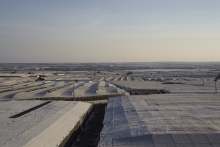What’s your favourite thing about Easter? For many of us, Easter means chocolate – and lots of it. After all, the British are some of the most dedicated chocolate consumers in the world. And Easter is the global blockbuster time of year for chocolate sales.
But chocolate also brings with it a bitter back story, both human and environmental.
Chocolate has a deforestation problem
The cocoa industry is linked to widespread deforestation. In fact, cocoa is one of seven commodities most commonly linked to deforestation around the world. From independence in 1957 and 1960 up to 2017, the top two cocoa producing nations, Côte d'Ivoire and Ghana, lost roughly 94% and 80% of their forests. Cocoa production was the single largest cause of forest destruction, contributing to roughly 1/3 of overall forest loss. The climate and wildlife crisis lurks behind our beloved Easter eggs and other chocolate treats.
Appalling rights abuses also run rampant in the cocoa industry. Right now the cocoa in our chocolate is almost all produced by farmers living in extreme poverty, making less than $1/day on average. Women cocoa farmers earn on average only 23p per day. The cocoa industry is also notorious for slavery, child labour and reckless use of pesticides which can harm the health of children who are exposed, as well as women cocoa farmers.
This has been recently highlighted in the Channel 4 documentary which investigates child labour in Cadbury's chocolate supply line.
It doesn’t have to be this way. It’s now much easier to buy ethically-produced chocolate, and consumers should demand higher standards from the handful of companies that control the world’s cocoa industry.






